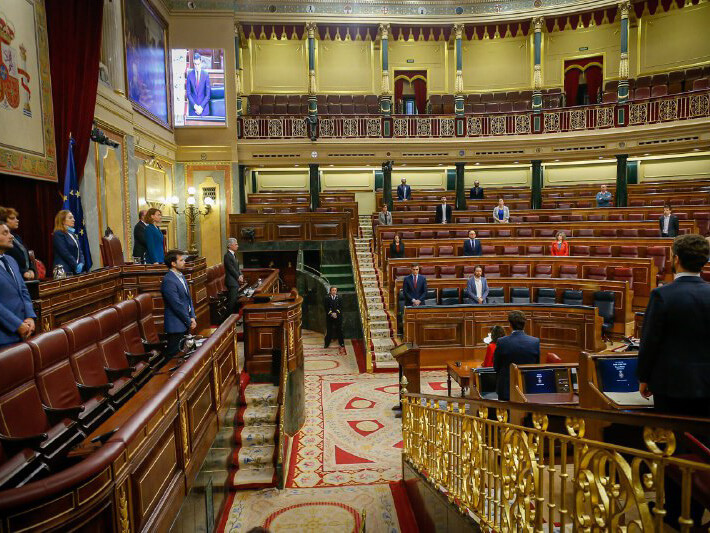Final update to this report at 20.30h on Thursday 9 April:
The Spanish Congress has voted in favour of extending the current ‘state of alarm’ lockdown until 26 April. Votes in favour, 270. Against, 54. Abstentions, 25. It follows a fierce debate during Thursday on the Spanish government’s handling of the Coronavirus pandemic.
Around 40 Spanish MPs were present in the parliament, the other votes were cast digitally.
Speaking in the Spanish Congress during Thursday, Spain’s Prime Minister Pedro Sánchez said that even after this current extension to the lockdown ends on 26 April, he is ‘convinced’ that he will have to ask for yet a further 15 days, which would prolong it until Sunday 10 May.
Earlier full report:
As the Spanish Congress reconvened on Thursday morning in Madrid to officially ratify an extension to the current ‘state of alarm’ lockdown [see updates below], the latest figures released by the Spanish Health Ministry at 11.30am on Thursday 9 April now confirm 152,446 known cases of Coronavirus (Covid-19) in Spain, 5,756 more than yesterday – but a decrease in the rate compared to yesterday. Wednesday had seen an increase of 6,108 over Tuesday.
15,238 people have now died from the pandemic in Spain, up by 683 from yesterday – another decrease in the daily rate. Wednesday had seen an increase of 757 over Tuesday – and Tuesday had been an increase of 743 over Monday.
There is good news in that 52,165 people have now made a full recovery, which is 4,144 more than yesterday.
Of the official figures announced, 43,877 confirmed cases are known to be in the Madrid region, and where 5,800 have died (from the total 15,238 across the country).
There are now 31,043 cases in Catalonia (3,148 deaths), 9,806 in the Basque Country (689 deaths), 9,261 in Andalusia (652), 12,489 in Castilla La Mancha (1,322) and 7,964 in Valencia region (767).
Figures for those infected with Coronavirus in other regions are as follows: Aragón 3,685 (385 deaths), Asturias 1,737 (110 deaths), Balearic Islands 1,448 (89), Canary Islands 1,834 (92), Cantabria 1,619 (98), Castilla y León 10,518 (1,082), Ceuta 84 (4), Extremadura 2,273 (283), Galicia 6,758 (231), Melilla 93 (2), Murcia 1,356 (88), Navarra 3,575 (214) and La Rioja 3,026 (182).
ALSO READ: Coronavirus in Spain full update (8 April)
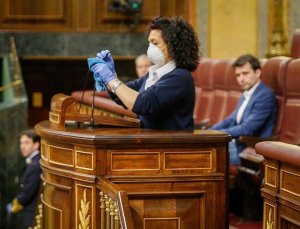
GLOBAL OVERVIEW
Coronavirus (Covid-19) has now killed more than 88,000 people and infected over 1.5m worldwide, according to statistics compiled by Worldometers, pushing the world into a devastating economic crisis as global commerce grinds to a halt.
The full after-effects of the pandemic around the world could push around half a billion people into poverty, Oxfam warned on Thursday.
In the USA, there were a further 2,000 deaths recorded on Wednesday, for the second day running, with flags now at half-mast in the worst-hit state of New York. Recent US data indicates that 10m people have now already lost their jobs in the world’s top economy.
New York Governor Andrew Cuomo said the pandemic curve seemed to be flattening, however. US President Donald Trump said, ‘We are hopefully heading towards a final stretch, the light at the end of the tunnel.’
In the UK there was a record death toll of 938 in 24 hours, and where Prime Minister Boris Johnson, 55, spent a third night in intensive care at St.Thomas’ Hospital in London, but with his condition said to be ‘improving’.
France saw the total number of dead rise above 10,000 as the country made plans to extend its strict lockdown measures. Italy is also still seeing hundreds of deaths per day despite signs the disease may have peaked.
Tedros Adhanom Ghebreyesus, the head of the World Health Organization (WHO), defended his agency’s handling of the Coronavirus pandemic on Wednesday, in response to Donald Trump’s criticism and suggestions that the USA would review its funding for the agency.
Ghebreyesus called for unity and a halt to ‘politicization’ of the global health crisis, specifically urging China and the USA to show ‘honest leadership’.
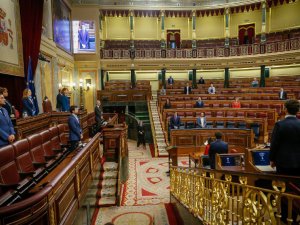
CORONAVIRUS in SPAIN
Spanish Congress debate ‘state of alarm’ lockdown
A minute’s silence was held in the half-empty Spanish Congress on Thursday morning to pay respect to the victims of Coronavirus, before the start of the debate to officially extend the current ‘state of alarm’ lockdown in the country until 26 April.
Spanish Prime Minister Pedro Sánchez of the PSOE socialist party said, ‘We are aware of the sacrifice that a second extension entails, but we know it is essential to consolidate our gains.’
‘We are starting to see light at the end of the tunnel,’ said Sánchez, ‘but we need to make this new effort to get out of that tunnel.’
Speaking in the Spanish Congress on Thursday, prime minister Sánchez also said that even after this current extension to the ‘state of alarm’ lockdown ends on 26 April, he is ‘convinced’ that he will have to ask for yet a further 15 days, which would prolong the end of the lockdown until Sunday 10 May.
Spain originally commenced its lockdown for two weeks from 14 March, with measures that confined everyone to their homes apart from leaving to purchase food or medication, or to go to their place of work only if they could not perform their duties from home. The measures were then extended until 12 April.
From Monday 30 March, further new measures ordered all non-essential workers in Spain to also remain at home until today, Thursday 9 April inclusive, thereby only returning to work after the Easter weekend (Friday 10 and Monday 13 April are holidays in most regions of Spain).
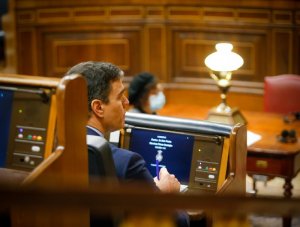
The lockdown extension until 26 April will certainly secure approval in the Congress vote today, thanks to the support from the main right-wing People’s Party (PP) opposition, as well as from the Ciudadanos (Cs) group and the Basque Nationalist Party (PNV).
Only the far-right Vox and pro-independence parties from Catalonia and the Basque Country are planning to vote against or abstain.
Sánchez, who is leading a coalition government between his PSOE party and the left-wing Podemos group – also reiterated his proposal for a cross-party consensus along the lines of the ‘Moncloa Pact’ to deal with the current Coronavirus crisis that has pushed Spain’s health system to its limits and will end up costing tens of billions of euros.
The Moncloa Pact of 1977, named after the Spanish prime minister’s official residence, the Moncloa Palace in Madrid, saw political parties, the business community and trade unions agree on a plan to solve Spain’s economic problems and help its transition from a dictatorship under Franco to a modern democracy.
Below are the numbers to call for each region of Spain for information and assistance in the event of possible cases of Coronavirus – as issued by the Spanish health authorities.
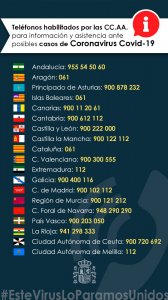
Up-to-date WHO advice and facts (in English) about the Coronavirus epidemic can be found here: www.who.int/emergencies/diseases/novel-coronavirus-2019/technical-guidance.
Our previous reports on Coronavirus in Spain:
ALSO READ: Coronavirus in Spain full update (8 April)
ALSO READ: Coronavirus in Spain full update (7 April)
ALSO READ: Coronavirus in Spain full update (6 April)
ALSO READ: Coronavirus in Spain full update (5 April)
ALSO READ: Coronavirus in Spain full update (4 April)
ALSO READ: Lockdown in Spain set to be extended until 26 April
ALSO READ: Coronavirus in Spain full update (3 April)
ALSO READ: Coronavirus in Spain: unemployment figures worst on record
ALSO READ: Coronavirus in Spain full update (2 April)
ALSO READ: Coronavirus in Spain full update (1 April)
ALSO READ: Coronavirus in Spain full update (31 March)
ALSO READ: FC Barcelona players agree to 70% pay cut, and will ensure staff receive 100%
ALSO READ: Coronavirus in Spain full update (30 March)
ALSO READ: Coronavirus in Spain full update (29 March)
ALSO READ: Coronavirus in Spain full update (28 March)
ALSO READ: Coronavirus in Spain full update (27 March)
ALSO READ: Coronavirus in Spain full update (26 March)
ALSO READ: Animal rights NGO starts petition against possible state aid for cancelled bullfights
ALSO READ: Spain publishes list of hotels that will remain open
ALSO READ: Coronavirus in Spain full update (25 March)
ALSO READ: Coronavirus in Spain full update (24 March)
ALSO READ: Video of boy training as goalkeeper in isolation goes viral
ALSO READ: The new restrictions at Spain’s airports, ports and land borders
ALSO READ: Coronavirus in Spain full update (23 March)
ALSO READ: Madrid starts receiving patients at IFEMA exhibition centre ‘hospital’
ALSO READ: Confirmed: lockdown extended until at least 11 April
ALSO READ: Coronavirus in Spain full update (22 March)
ALSO READ: Walking a goat or a Vietnamese pig is not allowed
ALSO READ: Coronavirus in Spain – full advice for British travellers seeking to return to the UK
ALSO READ: Coronavirus in Spain full update (21 March)
ALSO READ: Coronavirus in Spain full update (20 March)
ALSO READ: ‘This virus we will stop together’ – video
ALSO READ: Coronavirus in Spain full update (19 March)
ALSO READ: Despite lockdown, Spaniards applaud health workers from balconies every evening
Editor’s note:
At Spain in English we’re always keen to also publish positive stories and features about life in Spain – not just the current news. With all cultural and sporting events currently on hold, as well as travel and gastronomic excursions, we welcome on-going contributions from all of you who’d like to send us articles for publication. Although we are unable to currently pay for contributions, we will certainly credit you and share the articles across our social media network (if of interest) – and/or also link to your own blogs or other sites. We currently welcome upbeat, positive and fun articles – perhaps how you’re coping with the ‘lockdown’ in your own area of Spain – or how your community is responding, or recommendations of help to others. We have a dedicated ‘Opinion, Blogs & Spanish Experiences‘ section where your articles will appear. We will edit for clarity and length only – and we reserve the right to not publish. Articles should be sent via email to editorial@spainenglish.com (preferably with a photo and credit details), and should be around 500 words (800 to 1,000 max). We will try to respond to everyone, but please be patient with us. We’re a very small team but with big ambitions! Please stay safe. Thank you for reading and following us.

